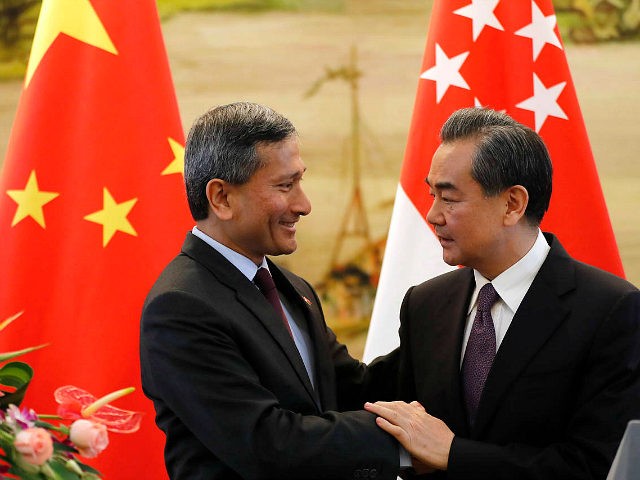Singapore is scheduled to assume the rotating chairmanship of the Association of Southeast Asian Nations next year, and China wasted no time this week making it known that it expects Singapore to keep a lid on ASEAN discontent over Chinese adventures in the South China Sea.
According to Reuters, Chinese representatives spent the last few months telling Singaporean officials “they don’t want trouble for Beijing” in 2018. Evidently, similar offers-you-can’t-refuse have been made to previous ASEAN chairs, including this year’s hosts, the Philippines.
“Beijing has made it very clear to Singapore what it expects on the South China Sea issue,” one Asian diplomat told Reuters. Another said China expects Singapore will heed its demands because it has an ethnic Chinese majority, no troublesome claims of its own on South China Sea islands, and a strong interest in peaceable free navigation through the region.
China, of course, puts all of this in terms of improving relationships and “upgrading practical cooperation” with Singapore and other ASEAN nations.
Singapore is in an unusual position diplomatically, poised almost precisely between the United States and China, in part because Chinese ire at Singapore for keeping ties with Taiwan produces the occasional dispute. The last one, as Reuters recalls, involved some Singaporean armored vehicles getting impounded in Hong Kong on their way home from training in Taiwan. There was some wailing in China’s state-run media about Singapore’s behavior putting their “special relationship” at risk.
Singapore also persists in taking seriously those pesky international arbitration rulings on South China Sea real estate that China despises. On the other hand, speaking of real estate, a good deal of Singapore’s property is now owned by Chinese speculators, developers, and home buyers.
Singapore’s Foreign Minister, Vivian Balakrishnan, declared his country’s relationship with China to be in “good working order” this weekend, after meeting with Chinese Foreign Minister Wang Yi.
Balakrishnan downplayed the recent turbulence between China and Singapore. “The challenges that we’ve had in the last one or two years are actually part of a maturation process in our relationship,” he said.
“How we handle the differences is more important than the differences themselves – to be able to overcome them and not let them become an insurmountable hurdle. More importantly, each time we resolve something it helps build trust. It helps strengthen the relationship,” Balakrishnan added.
Wang, in turn, praised Singapore as a “positive and constructive” member of ASEAN and said it could play a “special and positive role” to improve relations between the association and Beijing when Singapore becomes chair.
One observer with a unique perspective on the complex relationship between China, Singapore, and the United States is Professor Huang Jing, who found himself booted out of Singapore right about the time Balakrishnan and Wang were toasting the new era of positive Sino-Singaporean relations.
Singapore does not often expel foreign-born residents, particularly not those as high-profile as Huang, who had permanent residency, a professorship at the Lee Kuan Yew School of Public Policy, and membership on the board of a major property developer. He was nevertheless suddenly declared an “undesirable immigrant” by the Ministry of Home Affairs and sent packing, without severance pay from the university, for “activities inimical to Singapore’s national interests.”
More to the point, the Ministry effectively accused Huang of being an agent of influence for a foreign country, but it didn’t say which one. Huang is Chinese-born, holds American citizenship, and occasionally writes pro-Chinese editorials for the Chinese Communist paper Global Times. He denied the charges against him and professed himself confused over whether Singapore believes he’s an agent for China or America. He’s basically the living incarnation of Singapore’s geopolitical balancing act.

COMMENTS
Please let us know if you're having issues with commenting.